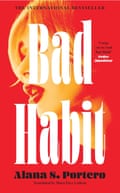
Aednan
Linnea Axelsson, translated by Saskia Vogel, Pushkin
This award-winning novel set in northern Sweden (the title means both “the land” and “my mother”) is subtitled “An Epic”, but its form – spare, haiku-like verse – means the pages breathe freely. The impressionistic style is matched by the structure, which shifts back and forward, covering a century from 1913 to 2015 in the lives of two indigenous Sámi families. They face the arrival of Swedish settlers and the destruction of their culture, including the building of a dam on Sámi land. One woman regrets her own failure to resist – “The Swedish / language grew / along my thoughts // The Sámi since long / asleep in the body / of shame // obedience overlaid” – and wonders of her children, “How am I to / explain to them // that the ruin / is in my voice.” The result is indeed epic, but also intimate and powerful.

Hungry for What
María Bastarós, translated by Kevin Gerry Dunn, Daunt
We’re never far from danger bursting out in this brisk collection of stories, the first to appear in English from Spanish writer Bastarós. A young girl, who believes her mother was “split in two” after her father’s death, tries to be grown-up by making dinner (Chipsticks and garlic are on the menu) but is powerless to change her mother’s eccentric whims. A woman who is stuck between her husband and her father, each worse than the other, finds that things turn nasty when they insist she declares which of them she loves best. There is ugliness here, given and received (“She wishes she’d inherited her mother’s knack for violence but the genetics didn’t pan out”), but it’s the freshness of the details and relentlessness of Bastarós’s vision that make this such an enthralling read.

You Dreamed of Empires
Álvaro Enrigue, translated by Natasha Wimmer, Harvill Secker
Even Mexican writer Enrigue’s previous novel to appear in English, the eccentric Sudden Death, couldn’t prepare us for this immensely playful tale of the “staggering effort and lunatic determination” of the Spanish conquistador Hernán Cortés in his attempts to conquer the Aztecs in the early 16th century. The plot at its simplest is the tense dance – half-war, half-diplomacy – between Cortés and the Aztec leader Moctezuma. Their hangers-on fight – “ripping hearts out like tomatoes” – and plot, and Moctezuma takes magic mushrooms; anything can happen, and frequently does (T Rex’s song Monolith makes an anachronistic appearance). “When someone puts what’s happening to us now in a book,” says one character, “they’ll think it’s more chivalric romance bullshit.” Maybe, but it’s a lot of fun to read.

Bad Habit
Alana S Portero, translated by Mara Faye Lethem, 4th Estate
This novel about growing up as a trans woman combines a personal story with a political history of a “brutal, tender” working-class area in Madrid. “Peace and calm were for rich districts.” There’s an energy here that lights up even the darkest scenes and leaves nothing out, good or bad, as the narrator encounters people who help her become who she is, from Saúl, who “strutted like Pete Burns” and wore “blemishes on his face left by his father’s fists”, to older trans woman Eugenia, who “had splurged on an ass that was perfect for mambo”. Full of life’s multifarious aspects, it’s a story that is funny, sad and triumphant all at once.

My Heavenly Favourite
Lucas Rijneveld, translated by Michele Hutchison, Faber
We’re back on the farm with Rijneveld’s follow-up to his International Booker-winning The Discomfort of Evening. This time there’s nothing so mild as discomfort: our narrator, known as Kurt, is a middle-aged vet whose story is told with a blend of pop culture markers (Pokémon cards, Nirvana, Saved by the Bell) and long sweeps of stylish prose. But there is no softening what has happened: it is the story of Kurt grooming and repeatedly raping a 14-year-old girl. “I saw the blue Smurf gum between your teeth and I pounded the hell out of myself, I pulled you with me to the depths of my depravity.” So far so Lolita, but there’s none of Nabokov’s winking to the reader here: Rijneveld is determined to horrify, and to grip us with his story. He succeeds on both counts.

.png) 1 month ago
12
1 month ago
12













































